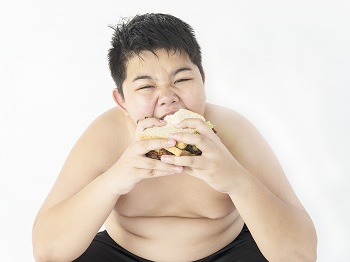
This photo is downloaded from https://www.vecteezy.com
Childhood obesity has become a pressing public health concern globally, with its prevalence steadily rising over the past few decades.
In combating this issue, parental awareness plays a pivotal role. Parents serve as primary influencers in shaping their children’s eating patterns, physical activity levels, and overall lifestyle choices.
Therefore, understanding parental awareness of childhood obesity is crucial in developing effective prevention strategies.
Eating Patterns and Healthy Eating
Parents play a central role in establishing their children’s eating patterns from an early age. The food choices made within the household significantly impact a child’s nutritional intake and weight management.
Research indicates that promoting healthy eating habits, such as consuming fruits, vegetables, whole grains, and lean proteins, can contribute to preventing childhood obesity.
However, parental knowledge and attitudes toward healthy eating greatly influence their ability to foster such habits in their children.
Weight Management and Physical Activity
Effective weight management in children requires a multifaceted approach integrating dietary adjustments and heightened physical activity.
Parents serve as pivotal motivators in promoting regular physical exercise, which is paramount for sustaining healthy body weight and overall well-being.
Nevertheless, modern sedentary lifestyles and sparse opportunities for physical engagement present formidable obstacles in the battle against childhood obesity.
Thus, establishing a family-oriented atmosphere that emphasizes and prioritizes physical activity emerges as indispensable for effective obesity prevention.
Encouraging outdoor play, participation in sports or recreational activities, and limiting screen time are essential strategies within such an environment.
By instilling these habits early on, parents lay the foundation for a lifetime of healthy habits and significantly reduce the risk of childhood obesity-related complications.
Best obesity awareness products
Understanding Health Risks and Health Behaviors
Parents must grasp the profound health risks linked to childhood obesity to enact proactive prevention measures. The repercussions of obesity in young individuals encompass a spectrum of conditions, spanning from type 2 diabetes and cardiovascular disease to musculoskeletal issues.
This awareness empowers parents to implement preventive strategies and instill healthy lifestyle behaviors in their families.
Encouraging routine health check-ups and consultations with healthcare providers further enhances early detection and intervention opportunities, offering a proactive approach to managing childhood obesity and its associated health complications.
Best obesity awareness products
Challenges and Barriers
Addressing childhood obesity presents a complex landscape of challenges and barriers that require nuanced understanding and comprehensive solutions.
Socioeconomic factors such as income disparities significantly impact families’ ability to access nutritious foods and engage in physical activity.
Low-income households often face financial constraints that limit their purchasing power, making it difficult to afford healthy food options and recreational activities.
This disparity in access perpetuates inequalities in health outcomes, with children from disadvantaged backgrounds being disproportionately affected by obesity-related health issues.
Cultural influences further complicate the picture, shaping dietary preferences and attitudes toward body weight within different communities.
Cultural norms surrounding food consumption and body image may prioritize traditional, often high-calorie foods, leading to unhealthy eating habits and weight gain, particularly among immigrant populations.
Addressing these cultural influences requires culturally sensitive approaches that respect and integrate diverse dietary practices while promoting healthier choices.
Limited access to healthy food options and recreational facilities, particularly in underserved communities, exacerbates the problem of childhood obesity.
Food deserts, areas with limited access to fresh produce and nutritious foods, contribute to reliance on processed and fast foods, which are often high in calories and low in nutritional value.
Similarly, inadequate recreational facilities and safe outdoor spaces restrict opportunities for physical activity, further compounding the issue.
Conflicting messages from the media and food industries further complicate efforts to combat childhood obesity.
Marketing tactics promoting unhealthy products, coupled with misleading health claims, contribute to consumer confusion and undermine efforts to promote healthy eating habits.
Overcoming these barriers requires a coordinated approach involving collaboration among various stakeholders.
Collective action among parents, healthcare providers, educators, policymakers, and community stakeholders is essential in addressing these challenges.
Collaborative efforts can foster supportive environments that promote education on healthy lifestyles, advocate for policy changes to improve access to nutritious foods and recreational opportunities, and counteract harmful marketing practices.
By working together, we can create a more equitable and conducive environment for preventing childhood obesity and promoting the health and well-being of all children.
Best obesity awareness products
Preventive Strategies and Interventions
Preventive strategies and interventions for childhood obesity must encompass a comprehensive approach that targets multiple levels of influence. At the individual level, education plays a crucial role in raising awareness about the importance of healthy eating and regular physical activity.
Behavioral modification techniques, such as goal-setting, self-monitoring, and reinforcement, can help individuals adopt and sustain healthy lifestyle behaviors.
Family-based interventions recognize the significant influence of familial dynamics on children’s health habits.
By involving parents and caregivers in intervention programs, these initiatives aim to create a supportive home environment conducive to healthy behaviors.
Family-focused educational programs provide practical guidance on meal planning, grocery shopping, and cooking nutritious meals, empowering parents to make informed choices for their families.
Additionally, promoting shared physical activities and recreational pursuits strengthens family bonds while encouraging active lifestyles.
Societal and environmental factors also play a critical role in shaping health behaviors. Community-wide initiatives, such as school-based nutrition education programs and neighborhood recreational facilities, contribute to creating environments that facilitate healthy choices.
Collaborative efforts with policymakers can lead to changes in regulations and infrastructure that promote access to healthy foods and safe spaces for physical activity.
In summary, effective preventive strategies for childhood obesity require a multifaceted approach that addresses individual, familial, societal, and environmental factors.
By implementing family-based interventions that combine education, behavior modification, and community support, we can empower parents and caregivers to foster healthy habits in children and create environments conducive to optimal health and well-being.
Best obesity awareness products
Conclusion: A Call to Action for Healthier Futures
Parental awareness about childhood obesity is not merely a concept; it’s a call to action. By understanding the role of parents in shaping their children’s eating patterns, physical activity levels, and overall lifestyle choices, targeted interventions can be developed to address the root causes of obesity.
Fostering a supportive family environment that promotes healthy behaviors and values is essential in instilling lifelong habits that contribute to optimal health and well-being for children and adolescents.
Through concerted efforts at the individual, family, community, and policy levels, we can collectively work towards creating a healthier future for the next generation.
Further Reading:
Peruvian Parents Perceptions of Children’s Obesity
AN EXPERIMENTAL STUDY TO CHILDHOOD OBESITY
Childhood obesity in early years
FAQs:
How can we raise awareness for childhood obesity?
Raising awareness for childhood obesity involves targeted educational campaigns through various channels, including schools, healthcare facilities, and community organizations. Utilizing social media platforms and public service announcements can reach a wider audience and promote healthy lifestyle behaviors. Engaging parents through workshops, seminars, and informational sessions can empower them to make informed decisions regarding their children’s health. Collaborating with policymakers to advocate for policies that support healthy environments in schools and communities is crucial. Encouraging community involvement and support networks can foster a collective effort in addressing childhood obesity.
�
How parents can prevent childhood obesity?
Parents can prevent childhood obesity by promoting healthy eating habits, such as offering nutritious meals and snacks, limiting sugary and processed foods, and modeling positive eating behaviors. Encouraging regular physical activity through family-based activities and limiting screen time also plays a crucial role. Additionally, fostering a supportive environment that emphasizes body positivity, self-esteem, and healthy lifestyle choices can help prevent childhood obesity. Regular communication with healthcare providers and staying informed about relevant nutrition and wellness guidelines further supports effective prevention efforts.
�
How does parenting affect childhood obesity?
Parenting significantly influences childhood obesity through factors such as establishing eating patterns, promoting physical activity, and shaping attitudes toward body weight. Parents play a crucial role in providing nutritious food choices, modeling healthy behaviors, and creating supportive environments for their children. Positive parenting practices, such as setting limits on screen time, encouraging outdoor play, and fostering open communication about health, can help prevent obesity. Conversely, neglecting these responsibilities or modeling unhealthy behaviors can increase the risk of childhood obesity. Ultimately, parenting behaviors have a profound impact on shaping children’s habits and attitudes toward food and exercise, significantly influencing their risk of obesity.
�
Are parents aware that their children are overweight or obese?
Parents’ awareness of their children being overweight or obese varies. Some may recognize the signs through visible changes in body weight or health indicators, while others may overlook or deny the issue. Cultural norms, misconceptions about healthy body weight, and lack of understanding about obesity-related health risks can influence parental awareness. Regular health check-ups and discussions with healthcare providers play a crucial role in increasing awareness and addressing concerns about childhood obesity.
�
What should parents know about childhood obesity?
Parents should be aware that childhood obesity is influenced by factors such as eating patterns, physical activity levels, and family behaviors. They should understand the health risks associated with obesity in children, including the development of chronic diseases like type 2 diabetes and cardiovascular problems. It’s crucial for parents to promote healthy eating habits, encourage regular physical activity, and create a supportive home environment. Seeking guidance from healthcare professionals and staying informed about preventive strategies is essential. By actively engaging in their children’s health and well-being, parents can play a significant role in preventing and managing childhood obesity.
�
How do parents prevent childhood obesity?
Parents can prevent childhood obesity by promoting healthy eating habits, including a balanced diet rich in fruits, vegetables, whole grains, and lean proteins. Encouraging regular physical activity is essential, incorporating activities that children enjoy and making exercise a family priority. Limiting screen time and promoting outdoor playtime also contribute to a healthy lifestyle. Additionally, being positive role models by demonstrating healthy behaviors and attitudes towards food and body image is crucial. Regular communication with healthcare providers and staying informed about nutrition and wellness guidelines further supports preventive efforts.
�
Why are parents responsible for childhood obesity?
Parents play a significant role in childhood obesity due to their influence on their children’s eating patterns, physical activity levels, and overall lifestyle choices. They provide the environment in which these behaviors develop, including access to nutritious foods and opportunities for exercise. Moreover, parental attitudes and behaviors regarding food and activity directly impact their children’s habits. Thus, parents hold a primary responsibility in fostering healthy habits and preventing childhood obesity through education, modeling, and creating supportive environments.
�
What is the relationship between parents and childhood obesity?
Parents play a critical role in shaping their children’s eating patterns, physical activity levels, and overall lifestyle choices, significantly influencing the risk of childhood obesity. They establish early dietary habits, provide food choices, and model behaviors that impact their children’s weight management. Moreover, parental awareness, attitudes, and socioeconomic status also influence access to healthy foods and opportunities for physical activity, further shaping the likelihood of obesity. Thus, the relationship between parents and childhood obesity is fundamental, with parental involvement being key in prevention and intervention efforts.

Pingback: How does parenting affect childhood obesity - childhood obesity awareness
Pingback: Are parents aware that their children are overweight or obese - childhood obesity awareness
Pingback: How parents can prevent childhood obesity - childhood obesity awareness
Pingback: How Can We Raise Awareness For Childhood Obesity - childhood obesity awareness